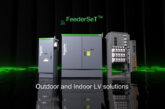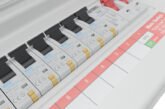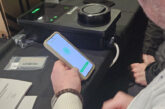
Are you ready to cater for the homes of tomorrow? David Williams, VP Transactional Business – Schneider Electric UK & Ireland, provides a glimpse into what the professionals working on these properties will look like.
Electricians’ job roles are continuously evolving. Smart home technologies, sustainable retrofits, changing regulations, the emergence of ‘energy prosumers’, and other changes are making it increasingly difficult to operate and innovate a successful business.
This wave of change also makes the reskilling and upskilling of workers, the fostering of a fresh pipeline of talent equipped to aid the homes of tomorrow, and a successful achievement of net zero by 2050, all the more urgent.
Mind the gap
According to the latest UK Trade Skills Index, there is an ‘alarming’ skills gap engulfing the construction sector, with over 100,000 new electricians required by 2032. The demand for electricians continues to intensify as diverse work opportunities increase. Numerous government initiatives, such as heat pump and solar panel grants, are creating a considerable boom as they target budget-savvy, smart energy consumers, and sustainably minded businesses.
Electricians are at the forefront of the new energy landscape. Staying ahead requires a constant stream of information and training to upskill. To become an ‘electrician of tomorrow’, they must embrace several key aspects crucial for success in the rapidly evolving industry: education, government regulations, net-zero targets, EV/PV technologies, and how to manage the extra energy load through innovative panels. Remaining proactive in the quest for new projects and knowledge is essential to capitalising on this tidal wave of new opportunities.
Educating electricians
Education and the hunger for knowledge is the foundation upon which any successful career is built. As technology and regulations evolve, staying updated with the latest trends and advancements becomes essential. To future-proof their skillset, electricians need to actively look for opportunities for continuous learning and upskilling to avoid being left behind.
Seek out accreditation
Pursuing professional accreditations and certifications not only boosts credibility but also demonstrates a commitment to excellence. Electricians can now participate in training programmes, workshops, and webinars hosted by industry experts and organisations that provide valuable insights and knowledge in an evolving sector.
As net-zero targets and compliance make their way into the everyday home, electricians can also capitalise by actively seeking accreditations for low-carbon solutions like solar panels (PV), heat pumps, and electric vehicle (EV) charging stations. By doing so, professionals can meet the growing demand for sustainable options, securing more projects and expanding their client base at the same time. Electricians will also differentiate themselves from their peers, by being better equipped to address the energy challenges of end-users, homeowners and home builders.
Offer apprenticeships
Business owners should also re-invest in their workforce by offering apprenticeships that ensure a fresh stream of talent, while also providing valuable training opportunities to keep their existing staff ahead of the curve. By staying up-to-date with the latest innovations and industry standards, electricians can enhance their reputation and attract more customers.
Turn to industry leaders
Collaborating closely with industry leaders in training offers electricians a unique advantage. By fostering strong ties with these figures, they gain invaluable insights into the ever-evolving regulatory landscape. This partnership not only ensures their compliance with the latest standards but also provides them with a comprehensive understanding of which companies are at the forefront of these regulations.
Pioneering the EV/PV revolution
The rise of electric vehicles (EVs) and photovoltaic (PV) systems has revolutionised the energy landscape, providing electricians with a unique opportunity to lead the charge.
For the EV industry, electricians can provide expert insights on charging infrastructure, installation, and maintenance. In the PV segment, electricians can showcase their expertise in solar panel installations and integration with smart home management systems, ensuring energy is used and stored at optimal times.
This also extends to the management of the added electrical load arising from the growing adoption of EVs and renewable energy sources, already an area of utmost concern as the move towards net-zero homes gathers pace.
Managing the extra load
With the increasing adoption of EVs and renewable energy sources, electricians must address the challenge of managing the extra load on electrical grids. The integration of electric vehicle supply equipment (EVSE) and smart panels can help homeowners and businesses optimise their energy consumption while ensuring grid stability.
Electricians should be knowledgeable about advanced load management systems and energy storage solutions. By offering building and homeowners comprehensive consultations on the benefits of smart panels and energy-efficient practices, professionals can empower them to make informed decisions about their energy usage.
Thinking outside of the (fuse)box
An effective marketing and web presence is a powerful tool for electricians to reach and engage with potential clients. The cornerstone of marketing success lies in a well-optimised business website. By deploying keywords and local SEO strategies, electricians can improve their visibility in online searches.
Social media platforms, such as YouTube, Instagram and even TikTok, can also facilitate direct interaction with customers, showcasing successful projects, answering questions, and receiving valuable feedback. Emphasising professionalism, customer reviews, and user-friendly website navigation can further boost the credibility and appeal of the business.
Nailing a good social media strategy as an electrical business can also serve as a funnel for education and inspiration to the younger audience which the industry so desperately desires.
Embracing the unknown
Ultimately, electricians should welcome new technology and the specialised skills required if they want to remain ahead of the curve. By investing in new software tools, they can streamline project management, automate processes, and improve overall efficiency.
By actively seeking out accreditations for low-carbon technologies like solar panels, heat pumps, and EV charging stations, electricians can also meet the growing demand for sustainable solutions. Moreover, upselling additional products or services to clients can demonstrate innovation, create more significant value for customers, and lead to repeat business and positive referrals.
Request a copy of Schneider’s ‘Becoming The Electrician of Tomorow’ e-book here










